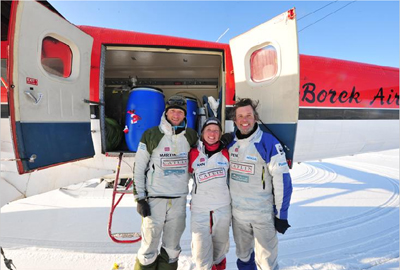
Teacher package: On thin ice - maths and climate change in the Arctic

From left to right: Martin Hartley, Ann Daniels, and Pen Hadow, the Arctic Survey ice team.
On the 1st of March 2009 three intrepid polar explorers, Pen Hadow, Ann Daniels and Martin Hartley, set out on foot on a gruelling trip across the Arctic ice cap. The aim of their expedition, known as the Catlin Arctic Survey, was to gather data on ice thickness that will help to predict when the North Pole sea ice cover will melt, an event that will have dramatic consequence for the Arctic ecosystem and the Earth's climate as a whole. (See Plus article On thin ice to find out more.)
This issue's teacher package brings you the result of a collaboration between Plus and Arctic Survey Education. The material consists of three "toolkits", focussing on some of the science that underlies the Catlin Arctic Survey and gives you the chance to see familiar science and maths applied to real-life problems. Each toolkit is made up of a background article and two worksheets with guidance notes for teachers. The overview article can be read on its own, or used as motivational material for the two worksheets. The worksheets are designed to promote group discussion of the topics, as well as provide hands-on activities.
The three toolkits
Navigation toolkit
This toolkit explores the navigational aspects of the expedition, including questions surrounding cartography and GPS systems. You can download the whole toolkit, or download the individual components:
- Finding your way around the Arctic — Background article;
- Mapping the Arctic with mathematics — worksheet and worksheet with guidance notes;
- Finding your way around the Arctic using GPS — worksheet and worksheet with guidance notes.
Climate change toolkit
This toolkit looks at models of climate change and sea ice growth. You can download the whole toolkit, or download the individual components:
- Arctic supermodels — Background article;
- Modelling ice thickness — worksheet and worksheet with guidance notes;
- Modelling the Earth's temperature — worksheet and worksheet with guidance notes.
Statistics toolkit
This toolkit explores statistical aspects of the expedition, including the "spin" that can be put on statistical evidence to make it sound positive or negative, and methods to predict future trends in Arctic climate change. You can download the whole toolkit, or download the individual components:
- Making sense of sea ice data — Background article;
- Predicting the trend — worksheet and worksheet with guidance notes;
- Presenting the evidence — worksheet and worksheet with guidance notes.
For more about maths and climate change also see the Plus archive. The Arctic Survey Education website also contains material for younger students.